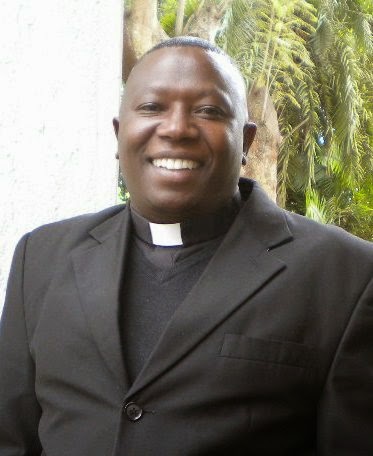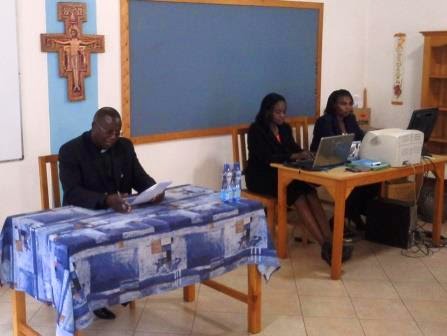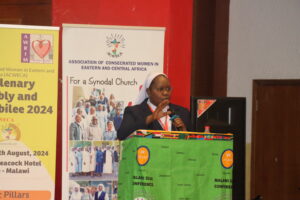AMECEA: Justice and Peace Department Engages in Matters of Environmental Justice

 |
| Fr. Jude Waweru, |
In an attempt to have a Church
that is collaborating with other interested actors to effectively and
positively engage in matters of environmental justice for the good of the
people, AMECEA Justice and
Peace department held a two-day workshop on Extractives Consultation for Kenya
Conference of Catholic Bishops (KCCB) and Uganda Episcopal Conference (UEC).
two conferences were chosen to participate in the ground breaking initiative
which comes as a response to the need for Church to be proactive in bringing
justice to helpless people who due to ignorance are often exploited. The
department will be working on modalities to conduct similar workshops to the
rest of AMECEA Conferences in the future.
 |
| Fr. Waweru giving his presentation during the workshop |
Addressing
the workshop participants in Nairobi Kenya, Fr. Waweru said that an attempt to
answer a deeper question “why are the people poor?” has revealed other facts. “Some
of the underlying problems we discovered included:-Policies that regulate
extractive industries are not clear or harmonized; Policies requiring the
rehabilitation of the environment are not followed to the letter; Where they
exist, they are not made known to the people and particularly those victims of
the activity; Some of the corrupt leaders have colluded with mining companies
in allowing miners that have not followed the due process.
transparency on the side of the government on how licenses are granted and on
the side of the miners on the money made from mining. Other are land
acquisition and displacement; and land acquisition and displacement ignorance; Most
of the affected people, especially those exploited by the miners are largely
ignorant and have no knowledge of how to go about expressing their grievances,”
he said.
explained that on the 3rd of September 2013, the Pontifical Council of Justice and Peace
brought together the executives of the mining industry who gathered together in
order to study “The principal ethical
problems arising from their activities, especially in Africa and in other
developing regions of the world.”
deeper investigation and intervention by the Church needs to be effected with
an objective of advocating for better mining policies and the equitable
distribution of the revenue to the service of the common good,” he said.
from that background, AMECEA Justice and Peace Department in June 2013
collaborated with KENDREN (Kenya Debt Relief Network) to conduct a survey of
the situation in Tanzania and Uganda by bringing national justice and peace
commissions and other players together to understand the mining status.
findings of that research were thirsting for more action. Among others, the
problem of negative environmental impact is clear. The degraded environment is
leaving the entire ecological system disturbed, bringing forth affliction, not
just to the animals and vegetation but also to the people whose livelihoods are
affected,” he said.
against that backdrop that AMECEA Justice and Peace department felt the desire to
do more in terms of bringing the Church leaders on board and assisting the
Church to sharpen her prophetic voice for policy intervention.
the workshop, which was held on 16th and 17th September
2014, it was proposed that the planned
activities of interventions should be enshrined within the Justice and Peace
operations as one of the activities that requires justice to be addressed.
Mining and extraction industry is the fact that workers are unable to agitate
for their rights due to lack of organized unions. In this regard, it was
proposed that the Justice and Peace Commissions should agitate the government to
organize the mining workers into unions.
government to make sure that it involves the community and the people around
the mining areas every time they are about to offer contracts or license to any
company to do mining so that the community may be aware of their rights and
what to expect from the mining companies.
acquisition, displacement and resettlements of persons from mining areas has
always been a big challenge and in most cases, members of the community are
made to suffer in the end. “The government cannot be the one interested in
mining and therefore interested in the land and at the same time paying for the
land and resettling people without any other independent authorities monitoring
the exercise. Chances are that the government will tend to be unjust in the way
it settles the people or pays back land,” he said.
commission/department as an arm of justice within the Church should involve
experts and lawyers in helping these communities to address those problems. “Any
legal services in Kenya or everywhere else is expensive and the majority of
ordinary people can barely afford especially when it comes to challenging the
government,” he said.
professionals who may be willing to give some services for free for the benefit
of the community, the Church should coordinate such kinds of free services and
assist the community.
Communications


